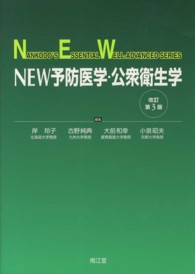- ホーム
- > 洋書
- > 英文書
- > Business / Economics
Full Description
From a war-torn and famine-plagued country at the beginning of the 1990s, Ethiopia is today emerging as one of the fastest-growing economies in Africa. Growth in Ethiopia has surpassed that of every other sub-Saharan country over the past decade and is forecast by the International Monetary Fund to exceed 8 percent over the next two years. The government has set its eyes on transforming the country into a middle-income country by 2025, and into a leading manufacturing hub in Africa.
The Oxford Handbook of the Ethiopian Economy studies this country's unique model of development, where the state plays a central role, and where a successful industrialization drive has challenged the long-held erroneous assumption that industrial policy will never work in poor African countries. While much of the volume is focused on post-1991 economic development policy and strategy, the analysis is set against the background of the long history of Ethiopia, and more specifically on the Imperial period that ended in 1974, the socialist development experiment of the Derg regime between 1974 and 1991, and the policies and strategies of the current EPRDF government that assumed power in 1991.
Including a range of contributions from both academic and professional standpoints, this volume is a key reference work on the economy of Ethiopia.
Contents
Part I: Context, Concepts, and History
1: Fantu Cheru, Christopher Cramer, and Arkebe Oqubay: Introduction
2: Shiferaw Bekele: Ethiopia's transition from a traditional to a developing economy (1890s-1960s)
3: Christopher Clapham: Ethiopia's political economy from the imperial period to the present
4: Teferi Abate Adem: Land tenure and land policy in Ethiopia (1950-2000)
5: Kidane Mengisteab: Federalism in Ethiopia's transformation
6: Assefa Fiseha and Fiseha Haftetsion Gebresilassie: The interface between federalism and development in Ethiopia
7: Menberetsehai Tadesse and Belachew M. Fikre: Ethiopia's constitutional framework and legal institutions for development
8: Fantu Cheru and Zinabu S. Rekisa: Ethiopia's 'economic diplomacy' and regional integration
Part II: Economic Development
9: Mekonnen Manyazewal and Admasu Shiferaw: Economic policy and structural transformation in Ethiopia
10: Yohannes Ayalew Birru: Ethiopian financial sector development
11: Mekonnen Manyazewal: Financing Ethiopia's development
12: Seid Nuru Ali: Infrastructure and economic transformation in Ethiopia
13: Ken Coutts and Christina Laskaridis: Financial balances and the development of the Ethiopian economy
14: Berihu Assefa Gebrehiwot: Trade policy in Ethiopia (1991-2016)
15: Christopher Cramer and John Sender: Policy, political economy, and performance in Ethiopia's coffee sector
16: Laura Hammond: Livelihoods and mobility in the border regions of Ethiopia
17: Haileselassie A. Medhin and Alemu Mekonnen: Green and climate-resilient transformation in Ethiopia
18: John Sender: Assessing poverty trends in Ethiopia (1990-2015)
Part III: Social Policy and Development
19: Tassew Woldehanna and Mesele W. Araya: Poverty and inequality in Ethiopia (1995/96-2015/16)
20: Abebe Shimeles: Growth, poverty, and distribution in Ethiopia
21: Assefa Hailemariam: Ethiopia's changing demography
22: Deborah Johnston and Helen Walls: Economic policy and food security in Ethiopia
23: Kalle Hirvonen, Derek Headey, Jenna Golan, and John Hoddinott: Changes in child undernutrition in Ethiopia (2000-2016)
24: John Hoddinott and Alemayehu Seyoum Taffesse: Social protection in Ethiopia
25: Zinabu Samaro Rekiso: Education and economic development in Ethiopia (1991-2017)
Part IV: Agriculture and Rural Transformation
26: Stefan Dercon and Douglas Gollin: Agriculture's changing role in Ethiopia's economic transformation
27: Alemayehu Seyoum Taffesse: The transformation of smallholder crop production in Ethiopia (1994-2016)
28: Guush Berhane and Kibrom A. Abay: Rural finance and smallholder farming in Ethiopia
29: Florian T. Schäfer, Tadesse Kuma Workako, and Bart Minten: Performance and institutions of the Ethiopian coffee sector
30: Florian T. Schäfer: Private coffee plantations in Ethiopia
31: Ayelech Tiruwha Melese: Constraints on the Ethiopian Floriculture Industry
32: Bart Minten, Seneshaw Tamru, and Thomas Reardon: Agricultural markets in Ethiopia
33: Fantu Nisrane Bachewe and Fanaye Tadesse: Livestock production in Ethiopia
34: Likimyelesh Nigussie and Annet A. Mulema: Women's empowerment in rural Ethiopia
Part V: Industrialization and Urban Development
35: Arkebe Oqubay: Industrial policy and late industrialisation in Ethiopia
36: Arkebe Oqubay: Structure and performance of the Ethiopian manufacturing sector
37: Admasu Shiferaw and Måns Söderbom: The Ethiopian manufacturing sector: Productivity, export, and competitiveness
38: Carlos Oya: Building an industrial workforce in Ethiopia
39: Mulu Gebreeyesus: The private sector in Ethiopia's transformation
40: Lindsay Whitfield and Cornelia Staritz: Light manufacturing in Ethiopia: The apparel export industry
41: Tesfachew Taffere: Technological learning and industrialisation in Ethiopia
42: Won L. Kidane: The legal framework for the protection of foreign direct investment in Ethiopia
43: Tadele Ferede and Belay File: Rural-urban linkages in Ethiopia
44: Tegegne Gebre-Egziabher and Edlam Abera Yemeru: Urbanisation and industrial development in Ethiopia
Part VI: Structural Transformation and the African Continent
45: Justin Yifu Lin, Jiajun Xu, and Sarah Hager: A New Structural Economics perspective on Special Economic Zones in Ethiopia
46: Ha-Joon Chang and Jostein Hauge: The concept of a 'developmental state' in Ethiopia
47: Kenichi Ohno and Izumi Ohno: A Japanese perspective on Ethiopia's transformation
48: John Sutton: Institution building for industrialisation: The Ethiopian Investment Commission
49: Carlos Lopes: Three sectoral policies in Ethiopia's structural transformation
50: K.Y. Amoako: Growing with depth: What African countries can learn from the Ethiopian experience








